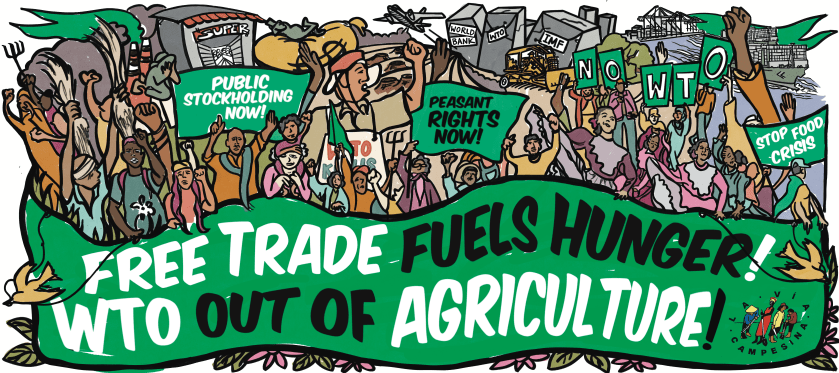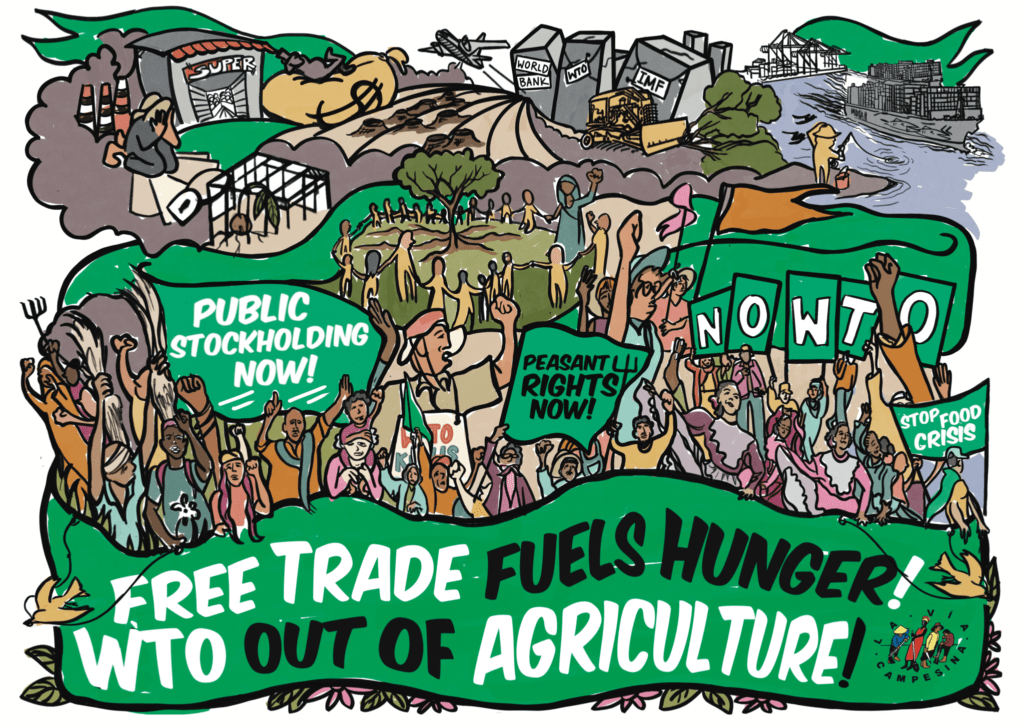Call for Mobilisation | WTO Ministerial in June, Geneva

Since the creation of the WTO in 1995, La Via Campesina has been denouncing the neoliberal and free trade policies that are destroying the peasantry and destabilising local food systems worldwide. From Seattle (1999) to Cancun (2003), from Hong Kong (2005) to Buenos Aires (2017), we have been fighting against the imposition of a free trade order in the service of big business and billionaires. On the 10th of September 2003, while protesting outside the WTO ministerial in Cancun, Mexico, peasant from KPL -South Korea Mr. Lee Kyung-Hae sacrificed his life by stabbing himself. That tragic incident exposed the destructive effects of WTO and its trade liberalisation efforts on the lives of millions of peasants globally.
Our mobilisations have made it possible to block the free trade negotiations. After our big mobilization in Hongkong 2005, the Doha Development Agenda which started in 2001 has been in limbo and there are no new major WTO agreements ever been adopted, especially in agriculture. However, The WTO was established based on the Marrakesh agreement in 1994; it still forces countries to open their markets to multinational companies and prevents the implementation of ambitious public policies in favour of peasants’ economy. Moreover, bilateral and regional free trade agreements have only multiplied.






Neoliberal policies and the imposition of free trade have greatly weakened peasantry around the world. They push countries to give priority to export crops and to depend on imports to feed their populations. They increase the grabbing of resources by multinationals, to the detriment of peasants and local communities. They contribute to the exacerbation of climate crisis by fostering monoculture plantations, deforestations, overexploitation of soils and water and dwindling our biodiversity.
Today, with the pandemic of COVID-19, with the extreme events linked to global warming and with the war in Ukraine and other places, it is clear that making people’s food security dependent on international trade and TNCs is criminal. This must stop. The WTO must get out of agriculture. Food sovereignty must be the basis of agricultural and food policies in each country and at the international level.
From the 13-15 June 2022, the WTO ministerial Conference will take place in Geneva. The WTO is struggling to seek relevance again in a world battered by inequality, hunger, extreme poverty, wars and a once-in-a-century pandemic.
La Via Campesina calls on civil society to mobilise to denounce this organisation and defend people’s food sovereignty. We will be in Geneva during the week holding a series of public mobilisations that will bring the voices of the rural territories right to the doorstep of the Ministerial venue.
La Via Campesina is also calling upon all our members and allies to organise public meetings, conferences, demonstrations, fair, issue public statements and press releases – between the 10th and the 15th of June – and expose the impact of Free Trade Agreements and WTO policies on rural and urban small-scale food producers.
Tag us on Facebook , Twitter or Instagram
Our slogan: Free Trade Fuels Hunger, WTO out of Agriculture!
Hashtags: #FreeTradeFuelsHunger #EndWTO
Also read What are our key arguments and proposals?
We have reiterated in our International Day of Action against WTO and Free Trade Agreements that for us– the global peasant movement of peasants, indigenous people, farm-workers, migrants, fishers and pastoralists – the only permanent solution that we have historically advocated for is that WTO and FTAs stay out of any agricultural discussions. Food cannot be subjected to the whims and fancies of a free market where only those who can afford it can eat it.
Also read “Prosperity for a few, Poverty for the lot”, WTO and free trade agreements have failed the people!
The UN Human Rights Council will also meet at the end of June in Geneva. This will be an opportunity for peasant movements from all over the world to affirm that the alternative must be based on peasants’ rights and to demand procedures for the implementation of the Declaration on the Rights of Peasants and Other Rural Workers (UNDROP).
Free Trade Fuels Hunger! WTO Out of Agriculture!


